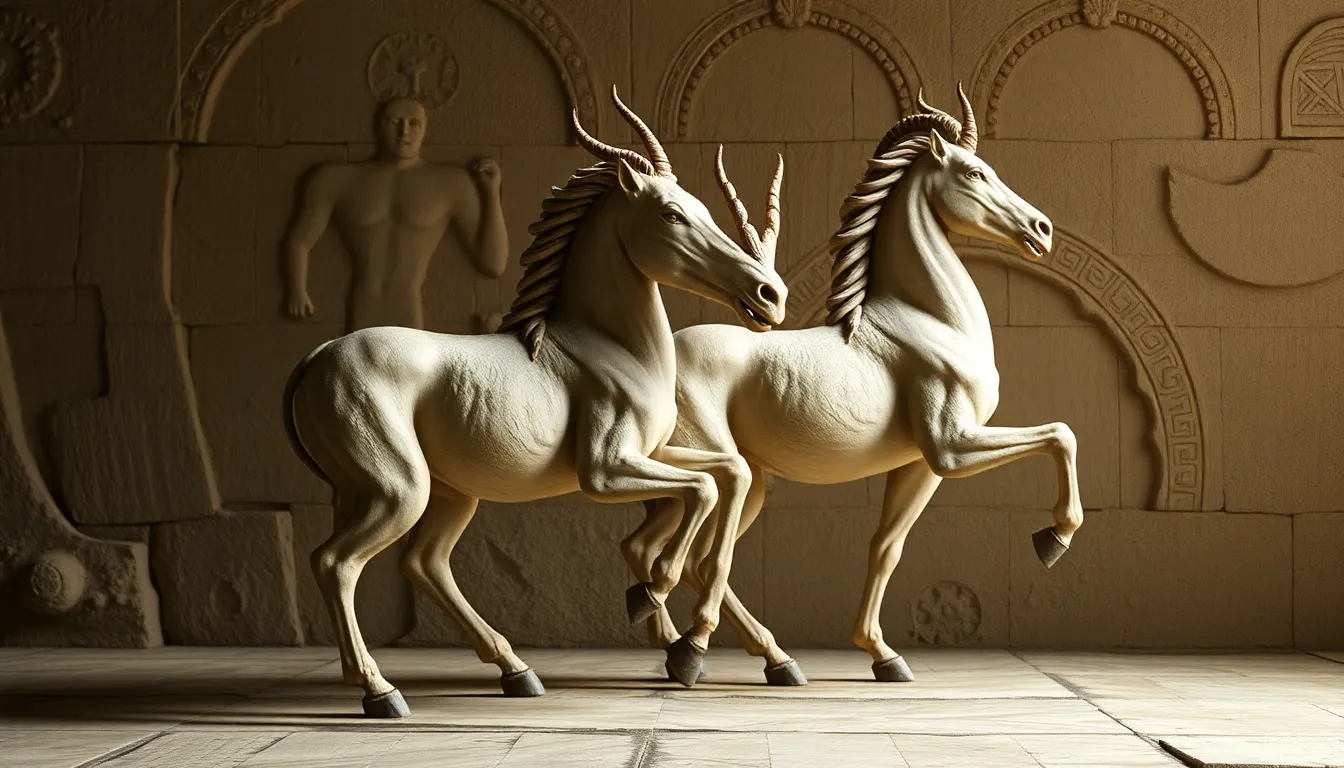The Role of Centaurs in Greek Mythological Family Dynamics
I. Introduction
Greek mythology is a tapestry of intricate stories filled with gods, heroes, and mythical creatures, each contributing to a rich narrative that often revolves around complex family relationships. Among these creatures, centaurs stand out as fascinating hybrids, embodying both human intellect and animalistic instincts. As half-human, half-horse beings, centaurs navigate the realms of civilization and untamed nature, symbolizing the duality of human existence.
This article will examine the unique role of centaurs in shaping family dynamics within Greek myths, highlighting their interactions with gods and mortals, their contributions to heroic narratives, and their enduring legacy in modern interpretations. Through this exploration, we will uncover how centaurs reflect the complexities of familial relationships in mythology.
II. The Origins of Centaurs in Mythology
The origins of centaurs can be traced back to various creation myths within Greek mythology. They are often depicted as the offspring of Ixion, a king of the Lapiths, and a cloud that was fashioned to resemble Hera. This union produced a race of beings that were both noble and savage, inhabiting the mountainous regions of Thessaly.
The significance of their mixed nature lies in their embodiment of the struggle between civilization and barbarism. As creatures caught between two worlds, centaurs reflect the complexities of family and identity, often representing the tension between civilized behavior and primal instincts.
III. Centaurs as Symbols of Wildness and Instinct
Centaurs are often portrayed as symbols of wildness, embodying the duality of human intellect and animalistic behavior. This duality manifests in their relationships with other mythological figures, where they can be both mentors and chaotic forces.
- Human Intellect: Centaurs like Chiron exemplify wisdom and knowledge, often serving as mentors to heroes.
- Animalistic Behavior: In contrast, other centaurs are depicted as unruly and aggressive, leading to conflicts and familial chaos.
Instances of centaurs embodying familial chaos are notably seen in their interactions with the Lapiths and the ensuing battle at Pirithous’ wedding. Conversely, moments of harmony can arise from centaur-hero relationships, illustrating the complexity of their family dynamics.
IV. Prominent Centaur Figures in Mythology
A. Chiron: The Wise Mentor
Chiron is perhaps the most renowned centaur in Greek mythology, revered for his wisdom and kindness. Unlike other centaurs, Chiron is characterized by his intelligence and gentle nature, making him a sought-after mentor for many heroes.
- Teaching Heroes: Chiron tutored notable figures such as Achilles and Asclepius, imparting knowledge and skills that would shape their destinies.
- Impact on Family Lineage: Through his mentorship, Chiron influences the lineage of heroes, ensuring that their legacies are intertwined with wisdom and virtue.
B. Pholus and the Tragic Feast
Pholus is another significant centaur whose story illustrates the tragic consequences of familial ties. Inviting Heracles to dine with the centaurs, Pholus unwittingly triggers a violent conflict among the centaurs.
- Familial Ties: The chaos that ensues highlights the fragility of centaur relationships, often marked by impulsive actions and misunderstandings.
- Consequences: The tragic outcome of their actions serves as a cautionary tale about the impact of recklessness within familial dynamics.
V. Centaur Interactions with Gods and Mortals
Centaurs have intricate relationships with various gods and mortals, revealing their multifaceted role in Greek mythology. Their interactions often reflect larger themes of family conflict and alliance.
- Relationships with Key Gods: Centaurs such as Chiron had close ties with gods like Dionysus and Apollo, serving as mediators between the divine and mortal realms.
- Mortal Family Conflicts: Their involvement in mortal narratives often showcases the complexities of family alliances, as seen in the battles with the Lapiths.
These interactions mirror human family dynamics, showcasing both cooperation and strife, ultimately enriching the narrative landscape of Greek mythology.
VI. The Centaur’s Influence on Heroic Narratives
Centaurs significantly contribute to the development of heroic narratives, often acting as mentors and catalysts for conflict. Their roles are pivotal in shaping the trajectories of various heroes.
- Mentorship: The guidance provided by centaurs like Chiron helps mold the characters of heroes, instilling values of honor and wisdom.
- Conflict: The tumultuous relationships between centaurs and heroes often lead to pivotal moments in mythology, highlighting the struggles inherent in family dynamics.
Case studies of specific myths, such as the training of Achilles and the chaotic events at the centaurs’ feast, illustrate how centaur-hero relationships are fundamental to understanding the broader themes of heroism and familial bonds.
VII. The Legacy of Centaurs in Modern Interpretations
The legacy of centaurs extends beyond ancient mythology, influencing contemporary literature and media. Their symbolism continues to evolve, reflecting modern themes of family dynamics.
- Influence on Contemporary Literature: Centaurs appear in modern narratives, often as symbols of the struggle between wildness and civilization.
- Evolution of Symbolism: The duality of centaurs resonates with current discussions about identity and belonging, mirroring the complexities of modern family structures.
These themes highlight the enduring relevance of centaur narratives, demonstrating how they resonate with contemporary audiences.
VIII. Conclusion
In summary, centaurs play a multifaceted role in Greek mythological family dynamics, embodying both the chaos and harmony that characterize familial relationships. Their narratives offer insight into the complexities of identity, mentorship, and conflict, enriching our understanding of mythology.
The lasting impact of centaur stories serves as a powerful lens through which we can examine family relationships, both in ancient times and in our modern society. As we reflect on the significance of centaurs in mythology, we are reminded of the timeless lessons they impart about the nature of family and the intricate dance between civilization and wildness.




